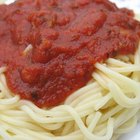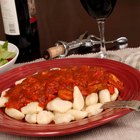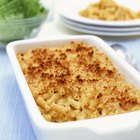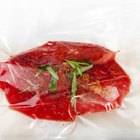tarfullhd/iStock/GettyImages
Refreezing Sauce Is Fine, if You Know the Rules
Many foods deteriorate sadly when they're frozen and thawed, and – even worse – can potentially make you ill if they're thawed and then refrozen. Barbecue sauce, because of its high sugar content, and spaghetti sauce, because of its high acidity, are relatively poor breeding grounds for microorganisms and therefore among the safer foods to refreeze. If you've thawed a large container of either sauce and want to refreeze the leftovers, it's usually not a problem.
Safe Thawing Techniques
There are three ways to safely thaw food, and leaving it out on your counter isn't one of them. Hazardous microorganisms flourish at temperatures between 40F and 140F, and room temperature in the average house is right in that "danger zone." The best and safest way to thaw your sauces is overnight in the fridge, where they'll never reach a temperature above the minimum for food safety. You can even thaw them a day or two ahead of time, if that's more convenient. Thawing your sauces in a large bowl of cold water is also effective, taking just a few hours. A microwave works too, but it heats your sauce and brings at least parts of it into the "danger zone." To keep the sauce food-safe, you'll have to keep right on cooking it until it reaches a safe reheating temperature of 165F.
Using Your Spaghetti Sauce
If you've thawed a large container of sauce and plan to only use a portion of it, safe handling is very simple. Once it's thawed, measure out the amount you'll need for the night's meal, repackage the remainder into one or more smaller containers, and return the still-cold sauce to the freezer. If your plan is to heat up all the sauce and then refreeze the leftovers, that adds a step or two. First, use a thermometer to make sure your sauce was reheated all the way up to a food-safe 165F. Once it's heated and served, pour any leftover sauce into shallow containers so it can cool quickly, and get it into the fridge within two hours. Once it's completely chilled, return it to the freezer. The reheated sauce won't taste quite as fresh as it did the previous time, so you might opt to brighten it up with a fresh batch of herbs the next time you use it.
Can You Refreeze Meat Sauce?
While an acidic tomato sauce is relatively safe from hazardous microorganisms, ground beef and Italian sausage aren't. That doesn't mean that spaghetti sauces containing meat need different handling, or can't be refrozen. As long as you've thawed, reheated and cooled the sauce properly, it's perfectly safe.
Using Barbecue Sauce
Thawed barbecue sauce is relatively straightforward to use because you won't normally heat it, you'll just thaw it and brush it onto your steaks, burgers or ribs. The only potential "gotcha" lies in your brush. If you brush sauce onto your meats and then dip the brush back into your container, you're contaminating the sauce with highly perishable juices from the meat. That makes it potentially unsafe, and therefore unsuitable for refreezing. If you aren't sure how much sauce you'll need, spoon it out into a smaller, separate container, and then keep refilling the smaller container as needed. Once you've finished at the grill, transfer the remaining barbecue sauce into a clean smaller container, and refreeze it.
Related Articles

Can You Refreeze Cooked Spaghetti Sauce ...

How to Store Pasta Sauce

Can You Cook Beef Stroganoff Ahead of ...

How to Freeze Marinara Sauces

How Long Is Leftover Spaghetti Good to ...

Does Cooking in Sauce Keep Meatballs ...

Number of Times Food Can Be Reheated
Can You Marinate & Refreeze Beef?

How to Degrease Sauce

Can I Marinate Steak Then Freeze It?

How to Cook Barbecue Deer in the Slow ...

What Does It Mean When Hamburger Smells ...
What Are the Dangers of Cooked Meat ...

Why Does a Sauce Curdle?

How to Get Married by a Justice of the ...

Rules for Thawing and Refreezing Meat

Is Frozen Ground Beef Left out for 3 ...

How Can I Counteract the Sourness of a ...

Can I Make Bernaise Sauce Ahead of Time?

Tips for Grilling Steak With A1 Sauce
References
Writer Bio
Fred Decker is a trained chef and prolific freelance writer. In previous careers, he sold insurance and mutual funds, and was a longtime retailer. He was educated at Memorial University of Newfoundland and the Northern Alberta Institute of Technology. His articles have appeared on numerous home and garden sites including GoneOutdoors, TheNest and eHow.